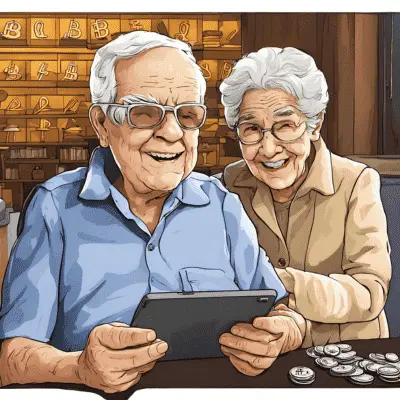Understand Cryptocurrency for Senior Citizens in 2024

Table of Contents
Introduction
In recent years, cryptocurrency has emerged as a revolutionary form of digital currency, capturing the attention of people worldwide. However, for senior citizens who may not be as familiar with technology, understanding this new financial landscape can seem challenging. In this article, we’ll break down cryptocurrency in simple terms tailored specifically for seniors, addressing common questions and concerns to understand the cryptocurrency for senior citizens.
What Is Cryptocurrency?
Cryptocurrency is a type of digital money that operates without the intervention of traditional banking systems. Unlike physical coins or paper money, cryptocurrency exists solely in digital form and is stored in digital wallets. Bitcoin is the most well-known cryptocurrency of thousands of others available and each has its own unique features and uses.
How Does Cryptocurrency Work?
Cryptocurrency transactions are recorded on a decentralized digital ledger called the blockchain. This ledger is maintained by a network of computers around the world, known as nodes. When someone makes a cryptocurrency transaction, it is verified by these nodes and added to the blockchain, ensuring transparency and security.
Key Terms to Understand Cryptocurrency for Senior Citizens
Below are some of the important terms to understand before investing in Cryptocurrency for Senior Citizens
- Blockchain: Think of a blockchain like a digital ledger or record book that keeps track of all cryptocurrency transactions. Instead of being stored in one place, copies of this record book are stored on many computers around the world.
- Wallet: A cryptocurrency wallet is like a digital wallet that holds your digital coins. It’s a secure place where you can store, send, and receive cryptocurrencies.
- Mining: Mining is the process of verifying and recording transactions on the blockchain. Miners use powerful computers to solve complex mathematical problems, and in return, they’re rewarded with new cryptocurrency coins.
- Altcoin: Altcoin simply means any cryptocurrency that isn’t Bitcoin. There are thousands of altcoins, each with its own unique features and uses.
- Volatility: Volatility refers to how much the price of a cryptocurrency goes up and down over time. Cryptocurrency prices can change rapidly, which means they can be risky investments.
- Fiat Currency: Fiat currency is traditional money issued by governments, like dollars or euros. It’s called “fiat” because its value is based on the government’s declaration rather than any intrinsic value.
- Exchange: A cryptocurrency exchange is like a digital marketplace where you can buy, sell, and trade cryptocurrencies. It’s similar to a stock exchange, but for digital currencies instead of stocks.
- Market Cap: Market cap is short for market capitalization, which is the total value of all the coins in circulation for a particular cryptocurrency. It’s calculated by multiplying the current price of the coin by the total number of coins in existence.
- Token: A token is a unit of value created by a project on the blockchain. Tokens can represent things like ownership in a company, voting rights, or access to a service.
- Decentralization: Decentralization means that control over a network is spread out among many different computers or nodes, rather than being controlled by a single central authority. This makes the network more resilient and less vulnerable to attacks or manipulation.
How Can Seniors Invest in Cryptocurrency?
There are several ways to invest in cryptocurrency for senior citizens:
- Cryptocurrency Exchanges: These online platforms allow users to buy, sell, and trade various cryptocurrencies. Popular exchanges present today are Coinbase, Binance, and Kraken.
- Brokerage Firms: Some traditional brokerage firms now offer cryptocurrency trading services, allowing seniors to invest through familiar channels.
- Cryptocurrency ATMs: Specialized ATMs called crypto ATMs allow users to buy and sell cryptocurrencies using cash. These ATMs are becoming increasingly common in many cities.
- Money Transfer Apps: Popular payment apps like PayPal, Cash App, and Venmo now offer the ability to buy, sell, and hold cryptocurrencies directly within their platforms.
Factors to Consider When Investing in Cryptocurrency for Senior Citizens
Below are some of the important factors to be considered before investing in cryptocurrency for senior citizens:
- Risk Tolerance: Seniors should assess their risk tolerance and only invest what they can afford to lose, as cryptocurrency markets can be highly volatile.
- Diversification: It’s essential for seniors to diversify their investment portfolios to mitigate risk. Cryptocurrency should only represent a portion of their overall investments.
- Research: Before investing in any cryptocurrency, seniors should conduct thorough research to understand the technology, market trends, and potential risks associated with their chosen investment.
- Regulation: Cryptocurrency markets are still relatively unregulated compared to traditional financial markets. Seniors should be aware of regulatory developments and potential implications for their investments.
Safeguarding Approaches to Protect Cryptocurrency for Senior Citizens
Some of the important safeguarding approaches to protect cryptocurrency for senior citizens are as below:
- Use Secure Wallets: Choose reputable digital wallets with robust security features to store your cryptocurrency safely. Hardware wallets can be considered for added security.
- Enable Two-Factor Authentication: Add an extra layer of security to your accounts by enabling two-factor authentication wherever possible.
- Keep Private Keys Secure: Your private keys are essential for accessing your cryptocurrency holdings. Those needs to be kept safe and not to be shared with anyone.
- Beware of Scams: Be vigilant against phishing scams, fraudulent schemes, and fake cryptocurrency projects. Always verify the legitimacy of any investment opportunity before committing funds.
Safer Cryptocurrency for Senior Citizens
While all investments come with risks, some cryptocurrencies are considered safer options than others due to their established track records, strong communities, and robust technology. Here are some safer cryptocurrencies that senior citizens may consider investing in:
- Bitcoin (BTC): Bitcoin is the original and most well-known cryptocurrency. It has a large user base, widespread acceptance, and a proven track record of security and reliability. As the first cryptocurrency, Bitcoin is often seen as a safe store of value and a hedge against inflation.
- Ethereum (ETH): Ethereum is the second-largest cryptocurrency by market cap and is known for its smart contract functionality, which allows for the creation of decentralized applications (dApps). Ethereum has a strong development team and a vibrant ecosystem of projects built on its blockchain.
- Binance Coin (BNB): Binance Coin is the native cryptocurrency of the Binance exchange, one of the largest cryptocurrency exchanges in the world. BNB has utility within the Binance ecosystem, including discounted trading fees and participation in token sales on the Binance Launchpad.
- Cardano (ADA): Cardano is a blockchain platform known for its focus on security, scalability, and sustainability. It uses a unique proof-of-stake consensus mechanism called Ouroboros, which is designed to be energy-efficient and secure. Cardano has a strong community and is backed by rigorous academic research.
- Stellar (XLM): Stellar is a decentralized payment network that allows for fast, low-cost cross-border transactions. It’s designed to facilitate the transfer of both fiat and digital currencies and has partnerships with major financial institutions and payment processors.
- USD Coin (USDC): USD Coin is a stablecoin pegged to the value of the US dollar. Unlike other cryptocurrencies, its value is not subject to the same volatility, making it a safer option for preserving wealth and hedging against market fluctuations.
- Uniswap (UNI): Uniswap is a decentralized exchange (DEX) built on the Ethereum blockchain. It allows users to trade a wide range of ERC-20 tokens directly from their wallets without the need for intermediaries. UNI is the native governance token of the Uniswap platform.
Conclusion
In conclusion, cryptocurrency for senior citizens presents exciting opportunities for seniors to diversify their investment portfolios and participate in the digital economy. By understanding the basics of cryptocurrency, conducting thorough research, and taking appropriate precautions, seniors can confidently navigate this new financial opportunity.
If you wish to read more similar articles. Click here
Frequently Asked Questions
While cryptocurrency investments can be lucrative, they also come with risks. It’s essential for seniors to do their research, invest cautiously, and only risk what they can afford to lose.
Yes, there is acceptability among many merchants now to accept cryptocurrency as a mode of payment. However, adoption varies by region and industry.
Cryptocurrency for Senior Citizens can be stored in digital wallets, which come in two main types: hot wallets (connected to the internet) and cold wallets (offline storage). Cold wallets are generally considered safer for long-term storage.
In most countries, cryptocurrency investments are subject to taxation. Seniors should consult with a tax professional to understand their tax obligations related to cryptocurrency investments.
Cryptocurrency can be a high-risk, high-reward investment, and its suitability for retirement depends on an individual’s risk tolerance and financial goals. Seniors should carefully consider their investment strategy and consult with a financial advisor if necessary.
